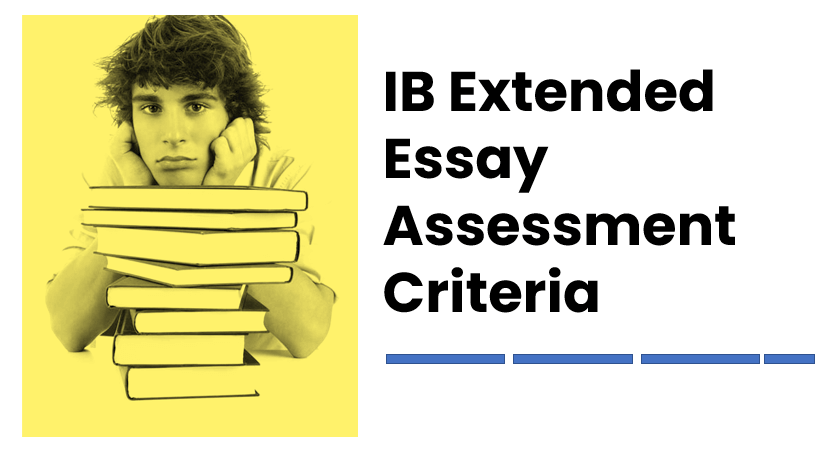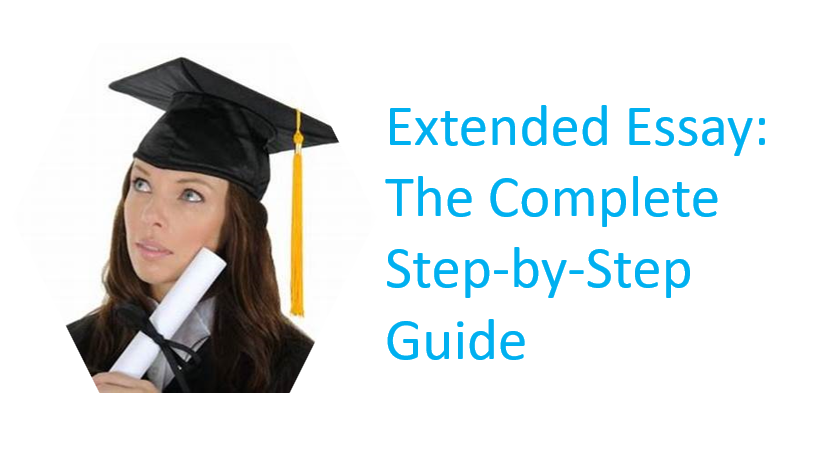Extended Essay: The Complete Step-by-Step Guide (2024)
Extended Essays are becoming a common type of essay for IB students. Unlike Advanced Placement, the International Baccalaureate is a more demanding, structured education framework that requires students to study extensively, write assignments, and score top grades to earn a diploma.
One of the research assignments you must complete to earn an IB diploma is the Extended Essay.
In this guide, you’ll learn everything you need to know about the Extended Essay, from what it is and why it’s essential to choosing a supervisor and creating an outline.
In short, if you’re looking for the complete guide to an Extended Essay, you’ll find this post incredibly helpful.
What is an Extended Essay?
An Extended Essay is an IB assignment that requires a student to conduct independent, self-directed research and present their findings in a 4,000-word paper.
Mandatory for all IB students, the role of the Extended Essay is to evaluate whether you can demonstrate critical thinking to solve complex, real-life problems.
The assignment is flexible because IB allows you to select your topic and approach to the project. And provided you write the EE based on the assessment criteria while ensuring you pay close attention to context presentation; you can be confident of scoring top marks.
To be abundantly clear, your Extended Essay can be about anything as long as it’s within the approved IB subjects’ limitations. Your instructor will want to see an essay on any of the following six subjects:
- Math
- Visual Arts
- Biology
- Chemistry
- English
- Geography
How Long Should An Extended Essay Be?
An Extended Essay should be 4,000 words long. Because it’s a self-directed piece of research with a rigid structure, the Extended Essay must not exceed the target word limit.
An Extended Essay must follow a rigid structure, which means you must not exceed the word limit set for the assignment. Ideally, IB states clearly that their instructors never read past the suggested word limit, and writing more words could cause you to lose some points.
The first draft can be 6000 words or even more for some research topics. However, such a lengthy document would require dedicated revision to delete 2,000 words. Still, writing more and editing later is a good practice because it helps to ensure you maintain relevance and clarity throughout the essay.
The Significance of IB Extended Essay
Writing an IB Extended Essay takes you on a learning journey that will help you to develop essential skills. Beyond the ability to demonstrate your prowess on the topic in writing, an Extended Essay is substantial in the following ways:
You Develop Research Skills: In addition to introducing, you to the type of undergraduate-level research, writing an Extended Essay will allow you to explore a topic of personal interest.
You Develop a Clear Understanding of Research: As you begin to work on the Extended Essay, you’ll meet with a supervisor who will help you to develop relevant research questions. By doing so, you’ll find it easy to explore the different aspects of your selected topic.
Develop Communication Skills: The IB Extended Essay will shape how you communicate ideas in high school and beyond your current education level. In the end, developing concrete arguments become easier.
Develop Social Relationships: You will meet with your supervisor throughout the Extended Essay project. The meetings can be an excellent opportunity to learn how to develop social relationships in high school and further education.

Given that an Extended Essay encourages independent, self-directed research on a topic of your choice, you should work on the project with the confidence that you’ll score high marks in the review stage.
How to Select Your IB EE Mentor
Before you learn how to write an Extended Essay on any subject, it’s important to pick the right EE supervisor (or mentor) to guide you through the process.
Remember, the EE is a strict, 4,000-word project with endless possibilities for topics. In this respect, it might be challenging to know where to start. However, with the help of a mentor, you’ll have an easy time planning, researching, and writing the assignment.
So, here’s how to select your mentor:
1. Pick a Mentor Who Teaches Your Subject of Choice
A teacher who teaches your subject of choice can give you more objective, in-depth feedback for your Extended Essay drafts.
However, don’t stress out if you can’t identify one. Even a teacher who teaches a related subject can be handy.
If you chose Visual Arts, you can ask a Language A or History teacher to guide you through the EE research and writing process.
2. Choose a Teacher You’ve Interacted With
It’s better to have smoother writing, feedback, and revision process than one filled with procrastination, postponement, and uncertainty.
We recommend choosing a teacher you’re already familiar with to be your supervisor.
3. Ask Early
IB teachers have busy schedules. From teaching class sessions to supervising students during an examination, they likely have more work to do and less time to themselves.
So, if you’ve identified a teacher who understands your subject and one you are familiar with, ask them a month or two before to be your EE mentor.
IB Extended Essay Assessment Criteria
The following are the assessment criteria used to review your IB Extended Essay:

A: Focus and Method (6 Marks)
To get six marks, you must communicate your message accurately and efficiently. That is, you should have identified and explained the research topic, making sure that the focus and purpose of the research are clear and appropriate.
B: Knowledge and Understanding (6 Marks)
To score six marks, ensure the source materials you select for the Extended Essay are relevant to the research question. In addition to using sources with understanding, you must ensure that the use of subject-specific concepts and terminologies is accurate and consistent.
C: Critical Thinking (12 Marks)
Critical thinking accounts for the highest points in the Extended Essay assignment. To score top marks for this criterion, you must demonstrate that:
Your research is relevant to the research question, with its application consistently suitable throughout the essay.
You have critically evaluated your study and focused on the research question. At the same time, the inclusion of less relevant research must not undermine the overall quality of research analysis.
The individual conclusions included in the study are not only pertinent but also supported by concrete evidence.
You must include focused and reasonable arguments developed from the research and provide reflective conclusions of the presented evidence.
Despite minor inconsistencies in your arguments, such errors don’t undermine the strength of your argument or conclusion.
D: Presentation: (4 marks)
To get four marks for the presentation, the structure of your Extended Essay must be relevant in terms of the convention of the topic, the argument, and the registered subject.
Moreover, you must present your layout based on the required consideration, with the structure and layout enhancing the reading, understanding, and review of the essay.
E: Engagement: (6 marks)
A score of 5 or 6 marks means your engagement with your Extended Essay topic is excellent.
In addition to your reflections on planning and decision-making being evaluative, they include references to your ability to consider action and ideas fit to counter setbacks experienced during the research process.
Furthermore, your reflections show an in-depth level of intellectual and personal engagement with the writing process and writing in a way that demonstrates authenticity, intellectual initiative, and a creative approach to writing.
8 Steps to Writing a Good IB Extended Essay
The following is how to write a good IB Extended Essay:
1. Understand Extended Essay Requirements
To write a good Extended Essay, you must first understand what the assignment requires. Although the essay gives you a taste of academic freedom by letting you to choose what to write, you must understand the following requirements first:
- Word Count Matters: Your EE must not exceed 4,000 words. Any additional word might cost you some marks or, worse, you may fail the paper.
- Outline: You must ensure your Extended Essay reflects the right format. We recommend that you prepare the outline and include all the relevant sections first, and then you can start writing.
- IB Approved Subjects: While you can write an Extended Essay on any topic, your topic selection must fall within one of the IB approved subjects.
- Reflection Sessions: Reflections are mandatory. They account for 17% of the final grades. So ensure you meet with your supervisor thrice to discuss your work’s progress.
2. Choose a Topic
IB gives you the option to choose any topic. So we recommend that you choose an interesting topic or a topic tied to an area that you’ve always wanted to explore.
Since you have limitless possibilities when it comes to topic selection, it makes more sense to select a topic that allows you to write something original.
3. Research, Research, Research
You must get the research right. Otherwise, the structure, case studies, and experiments won’t fit on their own.
- Read the assignment guidelines to find out whether you should use primary sources, secondary sources, or both.
- Check whether the assignment requires you to collect data from someone else, use people’s points of views, look for facts, or create personalized data.
- Consult with your supervisor to determine how recent your research should be.
You must conduct your research based on the suggestions from your mentor, the topic selected, and the subject of choice.
4. Develop Your Research Question
The third step to writing an Extended Essay is to develop a research question. You must develop a clear research issue to give your reader an apparent focus of the essay.
According to the IBO EE guide, your research must meet the following requirements:
- It must be clear, concise, detailed, and specific.
- Your research question must have a tight link to the topic you would like to explore in 4,000 words.
- The question should be something worth asking.
5. Create an Outline for the Assignment
An Extended Essay outline should feature the following format.
- Your research questions
- Cover page
- Table of contents
- Introduction
- Main body
- Conclusion
- Bibliography
- 3 Reflections
You must use the outline in the order provided.
Also, note that an Extended Essay doesn’t require an abstract. You can include one if you want to, but it won’t be part of the word count.
6. Consult Your Supervisor
Perhaps the best thing about the EE assignment is that you have the opportunity to consult with your supervisor any time you like.
We’ve already shown you how to choose a mentor.
Now all you have to do is consult with them. They will help you to determine whether you’re on the right track or not.
7. Write Your First and Last Draft
If you’re confident that you’ve done sufficient research and organized your ideas in a logical order, write your drafts.
Your first and second drafts don’t have to be perfect, so you don’t have to worry about grammar, spelling, or punctuation errors.
Focus on giving life to your outline. Then, you can use the second draft to write a final draft to edit for submission.
8. Edit Your Work
The last step in writing an Extended Essay is to proofread and edit your work. Editing helps you to remove grammatical, typographical, and spelling mistakes. Also, it helps you correct errors of omission, not to mention it allows you to make your Extended Essay comprehensive and concise.
How to Make Your Good Extended Essay (EE) Perfect
If you’ve written your Extended Essay, but you aren’t satisfied with the conciseness and the quality of information you’ve put down on paper, here are some tips to help you make your good EE great.

1. Check Your Work for Plagiarism
The last thing an EE supervisor wants to see is a copy of plagiarized work. Even a small percentage of plagiarism can hurt your overall score – or get the whole paper canceled out altogether. As such, countercheck your work for uniqueness before submission to ensure that your writing is 100% custom.
2. Attend All the Reflection Sessions
Ensure you attend all the three reflection meetings as instructed in the Extended Essay guideline.
There are three reasons why these meetings are important:
- The reflection sessions account for 17.6% of your final grades.
- The reflection sessions allows you to get mixed comments on your Extended Essay.
- Feedback from the reflections will help you to make your final draft concise and comprehensive.
3. Do Additional Research (If You Have To) for your Extended Essay
If you’ve written the first 3,500 words of the essay but feel like the paper would use additional information to strengthen your argument or point of view, do additional research.
Dip your toes in academic databases such as Google Scholars, JSTOR, and Academic Search for peer-reviewed articles and journals. These can make for some great primary and secondary sources of information for your Extended Essay.
4. Check Your EE Against the Grading Criteria
There is no better way to earn top marks for your Extended Essay than to get into the head of an examiner.
Since you already have access to the assessment criteria, check your work against the document immediately you finish with the second draft. Doing so is the only sure way to determine whether your writing meets the requirements for the EE.
5. Read Your Friend’s Extended Essay
The idea here isn’t to feel bad if you find your friends’ EEs to be better than yours. The exemplars are goldmines intended to help you identify what others have done better. Add these touches to your Extended Essay to make an appeal.
6. Edit Your Work to refine your Extended Essay
Your first and second drafts won’t be perfect. Some of the most common mistakes you’ll make include redundancy, spelling errors, typographical issues, error of omission, and overly superfluous writing.
So, edit your work.
Delete words, phrases, sentences, and paragraphs that neither make sense nor add value to your research. Correct spelling mistakes, remove typographical errors, and remove instances of complex writings.
7. Countercheck the Sources Used in Your Extended Essay
Even if you strongly believe that your Extended Essay includes the best information on the topic, countercheck your sources to ensure you’ve thoroughly analyzed your topic and drawn the most reasonable conclusion for the study.
Important Links
- 15 Extended Essay Writing tips to help you score an A in 2024: Ideas, Guide, Examples
- How is IB EE Graded? 2024 IB EE Grading
- What is an Essay? The Complete Guide with Definition, Types, and Writing Tips
- Google Scholar | Get the best credible sources.

